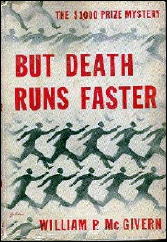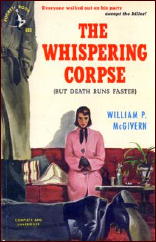Thu 23 Jan 2014
Reviewed by William F. Deeck: WILLIAM P. McGIVERN – But Death Runs Faster.
Posted by Steve under Pulp Fiction , Reviews[2] Comments
William F. Deeck

WILLIAM P. McGIVERN – But Death Runs Faster. Dodd Mead, hardcover, 1948; Pocket #693, 1950, as The Whispering Corpse. Berkley, paperback, 1988, under original title.
Tone-Bailey Publishing Company hires Steve Blake, mystery writer and author of Nor Live So Long among other novels, to edit a new pulp magazine, Modern Detective. (Little did they know that the handwriting was on the wall and that it approximated mene, mene, tekel, upharsin.)
Blake lacks editing experience, so he hires as assistant editor Byron Crofield, a young man who has editing experience and who has written some not-very-good books. Crofield turns out to be an absolute bounder, who probably also has no talent. Crofield dabbles in blackmail for the pleasure of distressing people, and he takes great delight in antagonizing his co-workers, including his employer.
When Crofield is murdered after a party to which he has invited all those who had reason to thoroughly dislike him, the suspects are not scarce.

Blake’s secretary, a young lady who was raped when very young and is both shy and fearful of men, receives a calI from Crofield short!y before his death telling her that Blake is at Crofield’s apartment, is drunk, and is threatening him with bodily harm. She then hears Crofield say, “Christ, Steve, don’t,” followed by two shots. Of course, this very timorous person immediate!y rushes to the apartment and finds Crofield dead.
If you can tolerate that extreme unlikelihood, all else should be acceptable, including Blake’s blurting out over the phone without being aware to whom he was talking information that causes another killing.
Blake, in my opinion, shares some of the less pleasant aspects of the murdered bounder, although he is not aware of it and I doubt that the author intended it. Thus, he is not a particularly sympathetic character. On the other hand, the information about pulp magazines, along with some of the discussions by pulp writers, whom McGivern does not treat very kindly, makes this an interesting novel from that aspect.
January 23rd, 2014 at 1:42 pm
For a long biography of McGivern, along with what seems to be a comprehensive bibliography, check out http://www.kirjasto.sci.fi/mcgivern.htm.
This was McGivern’s first crime novel, and from the cover image, it won one of Dodd Mead’s several prize contests held back in the 1940s. (And if I’d known that the pulp magazine publishing business was involved, I’d have read it a long time ago, but alas I haven’t.)
Also note that McGivern was the author of THE BIG HEAT, the movie version of which was reviewed here a few days ago: https://mysteryfile.com/blog/?p=24885
January 23rd, 2014 at 2:40 pm
Missed this one somehow, and since it’s McGivern and the pulps I’ll have to catch up.